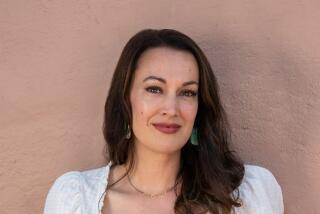An admittedly unsavory New York story
- Share via
Nowhere does the thought of school admissions raise more blood pressures or tingle more spines than in Manhattan: land of the rich, the competitive and -- as Nancy Lieberman’s novel “Admissions” tells us loud and clear -- the corrupt. Nowhere does parental love and ambition collide more disturbingly, and nowhere do parents wear their kids’ credentials like accessories more shamelessly.
It follows, then, that Manhattanites go to often unbelievable lengths to secure places for their children in the best schools. Lieberman doesn’t stop with the contortions of parents. Into this swampy world she wades, exposing everything from the deviant kindergarten consultant (who knew they even existed?) to the criminal headmistress.
The story follows the Dragers through the months leading up to February, when New York high schools make their choices of incoming freshmen. Helen Drager has become an admissions hound for her daughter, Zoe. She’s also an art critic whose professional life consists of sporadically dropping into galleries. Her basketball-obsessed husband, Michael, is a producer for the Cooking Network. They form a wealthy, hip and loving family unit, well schooled in the verses of therapy culture. And like that of any self-respecting New York parents, the Dragers’ love for their daughter is manifested by sending her to the best K-8, where Helen heads the Parents’ Association and is best friends with the admissions officer.
Lieberman painstakingly paints the ups and downs of family and social life as Zoe and her cohorts apply to high school. Everyone is constantly evaluating one another’s admissibility. Judgments are never based on academic record -- the whole process is reduced to wealth, hoop-jumping and connections. The Dragers must fend for themselves in a dog-eat-dog world, something they turn out to be rather good at.
This world is littered with caricatures, including John Toppler, a seething, brutal class-action attorney who refuses to allow his gay, Judy Garland-loving son to go to design school, and the Winters, who abrasively insist that they’re home free because they went to the headmistress’ cooking course in Provence. The Winters refuse to acknowledge their daughter’s anorexia even when she collapses at 83 pounds. Then there’s Phillip Cashin (one of several wordplays the author uses to emphasize her point), a rich, gorgeous single parent who dallies with Helen Drager’s heart.
The Dragers aren’t exactly caricatures, but they don’t seem to have a life beyond being responsible if not perfect parents with a decent, pretty and temperamental teenager. The book seems caught between being a lengthy reference volume and a newspaper satire column. It is bulky, but the characterizations are far, far too slim. The prose obscures the things it should be developing: humor, cynicism, sympathy. It doesn’t probe the mother-daughter experience; it merely tires the eyes. It’s a wordy, woolly, doggedly relevant poncho of a saga.
But it is unpleasantly disconcerting that Helen connives like the worst admission hound to get Zoe to the “right” campus and feels sick when her daughter mentions public school. The moral of the “Admissions” story, then, is that you should do whatever it takes, apart from demanding intellectual rigor or asking your children what they really want, in order to get them into private school. The Dragers had seemed poised to prove something different, and, frankly, we’d quite like them to. But “Admissions” reminds us of the dreary, infinite pettiness of the modern soul.
*
Zoe Strimpel is a critic and reviewer.
More to Read
Sign up for our Book Club newsletter
Get the latest news, events and more from the Los Angeles Times Book Club, and help us get L.A. reading and talking.
You may occasionally receive promotional content from the Los Angeles Times.










